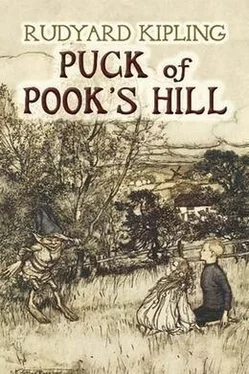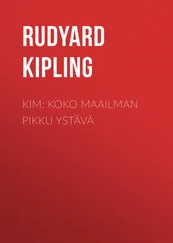Rudyard Kipling - Puck of Pook's Hill
Здесь есть возможность читать онлайн «Rudyard Kipling - Puck of Pook's Hill» весь текст электронной книги совершенно бесплатно (целиком полную версию без сокращений). В некоторых случаях можно слушать аудио, скачать через торрент в формате fb2 и присутствует краткое содержание. Год выпуска: 2014, Издательство: epubBooks Classics, Жанр: Фэнтези, на английском языке. Описание произведения, (предисловие) а так же отзывы посетителей доступны на портале библиотеки ЛибКат.
- Название:Puck of Pook's Hill
- Автор:
- Издательство:epubBooks Classics
- Жанр:
- Год:2014
- ISBN:нет данных
- Рейтинг книги:3 / 5. Голосов: 1
-
Избранное:Добавить в избранное
- Отзывы:
-
Ваша оценка:
- 60
- 1
- 2
- 3
- 4
- 5
Puck of Pook's Hill: краткое содержание, описание и аннотация
Предлагаем к чтению аннотацию, описание, краткое содержание или предисловие (зависит от того, что написал сам автор книги «Puck of Pook's Hill»). Если вы не нашли необходимую информацию о книге — напишите в комментариях, мы постараемся отыскать её.
Puck of Pook's Hill — читать онлайн бесплатно полную книгу (весь текст) целиком
Ниже представлен текст книги, разбитый по страницам. Система сохранения места последней прочитанной страницы, позволяет с удобством читать онлайн бесплатно книгу «Puck of Pook's Hill», без необходимости каждый раз заново искать на чём Вы остановились. Поставьте закладку, и сможете в любой момент перейти на страницу, на которой закончили чтение.
Интервал:
Закладка:
'A great gathering of Barons (to most of whom we had lent money) came to Bury, and there, after much talk and a thousand runnings–about, they made a roll of the New Laws that they would force on the King. If he swore to keep those Laws, they would allow him a little money. That was the King's God—Money—to waste. They showed us the roll of the New Laws. Why not? We had lent them money. We knew all their counsels—we Jews shivering behind our doors in Bury.' He threw out his hands suddenly. 'We did not seek to be paid all in money. We sought Power—Power—Power! That is our God in our captivity. Power to use!
'I said to Elias: "These New Laws are good. Lend no more money to the King: so long as he has money he will lie and slay the people."
'"Nay," said Elias. "I know this people. They are madly cruel. Better one King than a thousand butchers. I have lent a little money to the Barons, or they would torture us, but my most I will lend to the King. He hath promised me a place near him at Court, where my wife and I shall be safe."
'"But if the King be made to keep these New Laws," I said, "the land will have peace, and our trade will grow. If we lend he will fight again."
'"Who made thee a Lawgiver in England?" said Elias. "I know this people. Let the dogs tear one another! I will lend the King ten thousand pieces of gold, and he can fight the Barons at his pleasure."
'"There are not two thousand pieces of gold in all England this summer," I said, for I kept the accounts, and I knew how the earth's gold moved—that wonderful underground river. Elias barred home the windows, and, his hands about his mouth, he told me how, when he was trading with small wares in a French ship, he had come to the Castle of Pevensey.'
'Oh!' said Dan. 'Pevensey again!' and looked at Una, who nodded and skipped.
'There, after they had scattered his pack up and down the Great Hall, some young knights carried him to an upper room, and dropped him into a well in a wall, that rose and fell with the tide. They called him Joseph, and threw torches at his wet head. Why not?'
'Why, of course!' cried Dan. 'Didn't you know it was―' Puck held up his hand to stop him, and Kadmiel, who never noticed, went on.
'When the tide dropped he thought he stood on old armour, but feeling with his toes, he raked up bar on bar of soft gold. Some wicked treasure of the old days put away, and the secret cut off by the sword. I have heard the like before.'
'So have we,' Una whispered. 'But it wasn't wicked a bit.'
'Elias took a little of the stuff with him, and thrice yearly he would return to Pevensey as a chapman, selling at no price or profit, till they suffered him to sleep in the empty room, where he would plumb and grope, and steal away a few bars. The great store of it still remained, and by long brooding he had come to look on it as his own. Yet when we thought how we should lift and convey it, we saw no way. This was before the Word of the Lord had come to me. A walled fortress possessed by Normans; in the midst a forty–foot tide–well out of which to remove secretly many horse–loads of gold! Hopeless! So Elias wept. Adah, his wife, wept too. She had hoped to stand beside the Queen's Christian tiring–maids at Court when the King should give them that place at Court which he had promised. Why not? She was born in England—an odious woman.
'The present evil to us was that Elias, out of his strong folly, had, as it were, promised the King that he would arm him with more gold. Wherefore the King in his camp stopped his ears against the Barons and the people. Wherefore men died daily. Adah so desired her place at Court, she besought Elias to tell the King where the treasure lay, that the King might take it by force, and—they would trust in his gratitude. Why not? This Elias refused to do, for he looked on the gold as his own. They quarrelled, and they wept at the evening meal, and late in the night came one Langton—a priest, almost learned—to borrow more money for the Barons. Elias and Adah went to their chamber.'
Kadmiel laughed scornfully in his beard. The shots across the valley stopped as the shooting party changed their ground for the last beat.
'So it was I, not Elias,' he went on quietly, 'that made terms with Langton touching the fortieth of the New Laws.'
'What terms?' said Puck quickly. 'The Fortieth of the Great Charter says: "To none will we sell, refuse, or delay right or justice."'
'True, but the Barons had written first: To no free man . It cost me two hundred broad pieces of gold to change those narrow words. Langton, the priest, understood. "Jew though thou art," said he, "the change is just, and if ever Christian and Jew came to be equal in England thy people may thank thee." Then he went out stealthily, as men do who deal with Israel by night. I think he spent my gift upon his altar. Why not? I have spoken with Langton. He was such a man as I might have been if—if we Jews had been a people. But yet, in many things, a child.
'I heard Elias and Adah abovestairs quarrel, and, knowing the woman was the stronger, I saw that Elias would tell the King of the gold and that the King would continue in his stubbornness. Therefore I saw that the gold must be put away from the reach of any man. Of a sudden, the Word of the Lord came to me saying, "The Morning is come, O thou that dwellest in the land."'
Kadmiel halted, all black against the pale green sky beyond the wood—a huge robed figure, like the Moses in the picture–Bible.
'I rose. I went out, and as I shut the door on that House of Foolishness, the woman looked from the window and whispered, "I have prevailed on my husband to tell the King!" I answered: "There is no need. The Lord is with me."
'In that hour the Lord gave me full understanding of all that I must do; and His Hand covered me in my ways. First I went to London, to a physician of our people, who sold me certain drugs that I needed. You shall see why. Thence I went swiftly to Pevensey. Men fought all around me, for there were neither rulers nor judges in the abominable land. Yet when I walked by them they cried out that I was one Ahasuerus, a Jew, condemned, as they believe, to live for ever, and they fled from me everyways. Thus the Lord saved me for my work, and at Pevensey I bought me a little boat and moored it on the mud beneath the Marsh–gate of the Castle. That also God showed me.'
He was as calm as though he were speaking of some stranger, and his voice filled the little bare wood with rolling music.
'I cast'—his hand went to his breast, and again the strange jewel gleamed—'I cast the drugs which I had prepared into the common well of the Castle. Nay, I did no harm. The more we physicians know, the less do we do. Only the fool says: "I dare." I caused a blotched and itching rash to break out upon their skins, but I knew it would fade in fifteen days. I did not stretch out my hand against their life. They in the Castle thought it was the Plague, and they ran out, taking with them their very dogs.
'A Christian physician, seeing that I was a Jew and a stranger, vowed that I had brought the sickness from London. This is the one time I have ever heard a Christian leech speak truth of any disease. Thereupon the people beat me, but a merciful woman said: "Do not kill him now. Push him into our Castle with his Plague, and if, as he says, it will abate on the fifteenth day, we can kill him then." Why not? They drove me across the drawbridge of the Castle, and fled back to their booths. Thus I came to be alone with the treasure.'
'But did you know this was all going to happen just right?' said Una.
'My Prophecy was that I should be a Lawgiver to a People of a strange land and a hard speech. I knew I should not die. I washed my cuts. I found the tide–well in the wall, and from Sabbath to Sabbath I dove and dug there in that empty, Christian–smelling fortress. Hé! I spoiled the Egyptians! Hé! If they had only known! I drew up many good loads of gold, which I loaded by night into my boat. There had been gold–dust too, but that had been washed out by the tides.'
Читать дальшеИнтервал:
Закладка:
Похожие книги на «Puck of Pook's Hill»
Представляем Вашему вниманию похожие книги на «Puck of Pook's Hill» списком для выбора. Мы отобрали схожую по названию и смыслу литературу в надежде предоставить читателям больше вариантов отыскать новые, интересные, ещё непрочитанные произведения.
Обсуждение, отзывы о книге «Puck of Pook's Hill» и просто собственные мнения читателей. Оставьте ваши комментарии, напишите, что Вы думаете о произведении, его смысле или главных героях. Укажите что конкретно понравилось, а что нет, и почему Вы так считаете.












